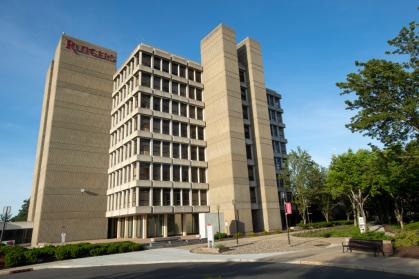Rutgers Office for Research Hosts Open House for New and Improved Animal Care Facilities

Rutgers researchers are welcome to tour and use these facilities to conduct their research
The Office for Research hosted a well-attended open house for researchers and faculty to tour the newly renovated 30,000 sq. ft. state-of-the-art Research Tower Core Services facility. The space, located on the Busch Campus, is now home to a handful of core services, including a vivarium, an imaging core, an aquatics facility, a training suite, and an in vivo procedure space dedicated to conducting critical and potentially life-changing scientific research.
Jeetendra Eswaraka, DVM, PhD, DACLAM, associate vice president for Rutgers University Animal Care (RUAC) said, “the Office for Research was able to create a modernized research space with cutting-edge technology that is easily available to further the faculty in an environment of tight budgets. We have a facility that can rival that of any well-funded pharmaceutical company.” Startups and companies are also able to collaborate with Rutgers and use these core facilities.
“It was great to see how much our faculty liked the new space and how they were thinking about new avenues for their research projects that were not envisioned just a few years ago,” he added. One thing Eswaraka would like Rutgers faculty to know about the space is that the facility is open to all Rutgers University faculty and is not restricted to just one school or college.

David P. Crockett, MA, PhD, assistant professor in the Department of Neuroscience and Cell Biology at Robert Wood Johnson Medical School (RWJMS), attended the open house. He found the newly automated home caging system and the in-vivo imaging system (IVIS) facility, which allow 24-hour monitoring and ways to track cell time that is affected by injury, to be helpful resources for his research studying traumatic brain injuries. He is excited that such a great facility is close by and was also impressed with the knowledge of the staff.
Matthew Keller, assistant director of Business Operations and Animal Facilities for Animal Care, who works at the facility, said that “Animal Care's staff provides hands-on instruction to all levels of users, whether it be a seasoned researcher learning an advanced technique or undergraduate students learning the skills for successful post-academic careers. There is no doubt that we have the resources and tools to help researchers push the boundaries of what is possible.”
He added, “The Research Tower vivarium is the epitome of Animal Care's mission to support research at the institution. The facility was carefully crafted to provide the most ideal space and technologies to continue to attract top research talent and accelerate the impact of their work on the global community.”

Eldo Kuzhikandathil, MSc, BE, PhD, executive director of administration at the Rutgers Brain Health Institute said what he found most interesting about the open house were the facilities and core services resources available for conducting animal research in the newly renovated vivarium. “I was surprised and impressed by the renovation and modernization of the space, including all the new environmental monitoring systems,” he said.
Kuzhikandathil added, “the core service will help expand the range of research questions the investigators can address.” He said that he would recommend the training core to faculty as “it is an invaluable resource for training new students and research staff” and encouraged faculty to “take advantage of this great resource.”
To schedule a tour of the facility, contact:
Jeetendra Eswaraka
Associate Vice President for Rutgers University Animal Care
jeetendra.eswaraka@rutgers.edu
(848)229-5679
or Vince Smeraglia
Executive Director of Core Services
vincent.smeraglia@rutgers.edu
(732) 956-6123
The Rutgers University Animal Care training program is essential to the success of the overall research program by ensuring continued excellence in animal care and welfare. It ensures that those working with animals are knowledgeable in policies and proficient in procedures resulting in safe practices, responsible animal care, and reliable data. Rutgers supports the humane use of animals in scientifically necessary, ethically conducted studies.



